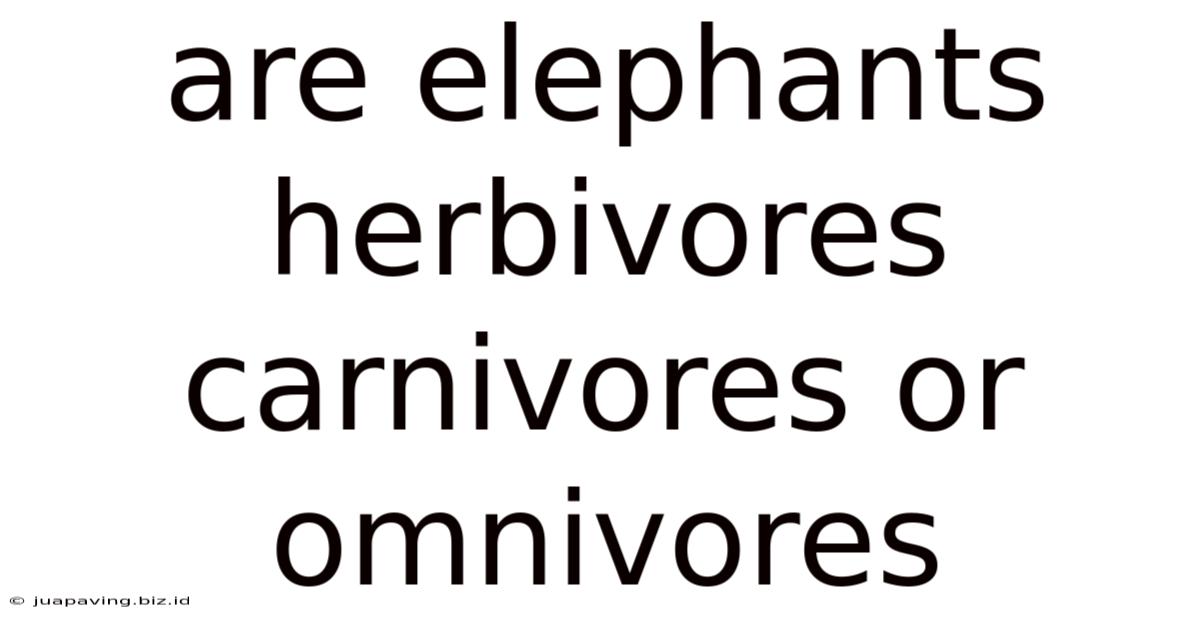Are Elephants Herbivores Carnivores Or Omnivores
Juapaving
May 13, 2025 · 4 min read

Table of Contents
Are Elephants Herbivores, Carnivores, or Omnivores? A Deep Dive into Elephant Diet
Elephants, the majestic giants of the savanna and forest, hold a captivating place in our imaginations. Their size, intelligence, and social complexity fascinate us. But beyond their imposing presence lies a fascinating dietary story. The question, "Are elephants herbivores, carnivores, or omnivores?" seems simple at first, yet unraveling the nuances of their eating habits reveals a more complex and intriguing answer. This in-depth exploration will delve into the intricacies of elephant diets, dispelling misconceptions and highlighting the ecological importance of these gentle giants' dietary choices.
The Undeniable Truth: Elephants are Herbivores
The short and sweet answer is: elephants are herbivores. This means their primary food source, and indeed the entirety of their nutritional intake, comes from plants. They are not known to actively hunt or kill animals for food. Their digestive systems, teeth, and behavioral patterns all point unequivocally to a purely herbivorous lifestyle.
A Closer Look at the Herbivorous Diet
Elephants' herbivorous diet is incredibly diverse, varying significantly depending on their habitat and the season. Their diet consists primarily of:
-
Grasses: A cornerstone of their diet, especially for elephants inhabiting savannas and grasslands. They consume vast quantities of grass, using their trunks to efficiently gather and ingest it.
-
Leaves: Elephants browse on leaves from a wide variety of trees and shrubs, utilizing their powerful trunks to strip leaves from branches.
-
Bark: The tough bark of trees also forms part of their diet, providing essential nutrients and fiber.
-
Fruits: When available, elephants relish ripe fruits, often traveling long distances to reach fruiting trees.
-
Roots: They use their tusks and trunks to dig up roots and tubers from the ground, supplementing their diet with underground resources.
-
Twigs and Branches: Younger twigs and branches are readily consumed, offering additional nutrients and fiber.
Specialized Digestive System for Plant Matter
To effectively digest the large quantities of tough plant material they consume, elephants possess a highly specialized digestive system. Their large stomachs and intestines are adapted to break down cellulose, the complex carbohydrate found in plant cell walls. The process is aided by symbiotic bacteria residing in their gut, which help ferment and extract nutrients from the ingested plant matter. This lengthy digestive process, along with their large size, allows them to extract maximum nutritional value from even low-nutrient plant sources.
The Role of Teeth in Herbivory
Elephants' unique dentition perfectly complements their herbivorous lifestyle. They possess specialized molars that continually grow throughout their lives, replacing worn-down teeth as they age. These large, ridged molars are perfectly suited for grinding tough plant material, effectively breaking down cellulose and extracting maximum nutrients. The continuous growth of their molars ensures they can maintain their ability to process plant matter throughout their long lifespans.
Dispelling Myths and Addressing Misconceptions
While the evidence overwhelmingly supports the herbivorous classification of elephants, some misconceptions persist. Let’s address some common myths:
-
Myth: Elephants occasionally consume meat. While there have been anecdotal reports of elephants consuming carrion (dead animals), these instances are exceptionally rare and likely driven by opportunistic behavior rather than a dietary necessity or preference. There's no evidence to suggest that meat forms a significant part of their diet, nor that they actively seek it out.
-
Myth: Elephants are opportunistic feeders. While their diet is diverse, and they may consume different plant materials depending on availability, this opportunistic behavior doesn't change their fundamental classification as herbivores. Opportunistic feeding strategies are common amongst herbivores.
The Ecological Importance of Elephant Herbivory
The dietary habits of elephants play a crucial role in maintaining the health and biodiversity of their ecosystems. Their massive consumption of vegetation shapes the landscape, influencing plant communities and promoting growth patterns. Their foraging activities contribute to:
-
Seed dispersal: Elephants consume fruits and seeds, and their droppings help spread these seeds across large areas, contributing to the regeneration and dispersal of plant species.
-
Nutrient cycling: Their dung is rich in nutrients, acting as a natural fertilizer that enriches the soil and supports plant growth.
-
Habitat creation: Elephants' activities, like knocking down trees and creating gaps in the forest canopy, create diverse habitats that benefit other plant and animal species.
-
Maintaining biodiversity: By influencing plant community composition, elephants help maintain biodiversity and prevent the dominance of any single species.
Conclusion: Understanding the Elephant's Dietary Niche
In conclusion, the evidence undeniably supports the classification of elephants as herbivores. Their specialized digestive system, dentition, and behavioral patterns all point towards a plant-based diet. While anecdotal evidence exists of occasional scavenging behavior, this does not negate their primary herbivorous status. Understanding the dietary habits of elephants is crucial to appreciating their ecological role and the importance of conservation efforts aimed at protecting these magnificent creatures and the ecosystems they inhabit. Their herbivorous lifestyle is integral to the health and biodiversity of their environments, highlighting the vital connections within the intricate web of life. Furthermore, their role as keystone species underscores the importance of preserving elephant populations to maintain the balance and integrity of their ecosystems. Continuing research into elephant diets will undoubtedly further enhance our understanding of these remarkable animals and their crucial role in the delicate ecosystems they call home.
Latest Posts
Latest Posts
-
Whats A Million Times A Million
May 13, 2025
-
An Attraction Between Molecules Of Different Substances
May 13, 2025
-
Which Of The Following Statements Is True About
May 13, 2025
-
Why Is The Blood Testis Barrier Important
May 13, 2025
-
What Is The Strongest Type Of Intermolecular Force
May 13, 2025
Related Post
Thank you for visiting our website which covers about Are Elephants Herbivores Carnivores Or Omnivores . We hope the information provided has been useful to you. Feel free to contact us if you have any questions or need further assistance. See you next time and don't miss to bookmark.